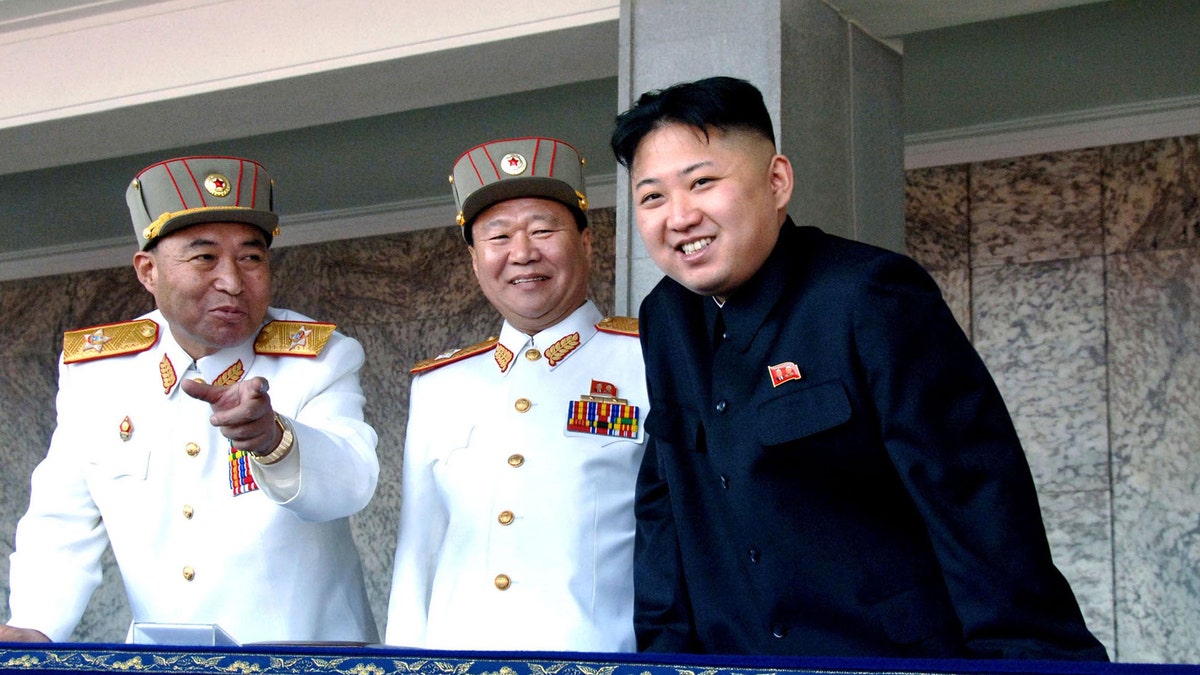
FILE: Undated: North Korean leader Kim Jong Un, (r.), with the Korean People's Army senior officers, preparing a satellite launch. (AP)
The eyes of the world are on North Korea, as the rogue republic counts down to a provocative launch U.S. officials believe is aimed at showing the world its missiles can strike anywhere.
U.S. warships were on the move in the Western Pacific, as Pyongyang readied the satellite launch, expected to take place between Monday and Dec. 22. Pacific forces commander Adm. Samuel Locklear said it is unclear whether the secretive dictatorship has corrected the problems of a failed launch of a similar long-range rocket in April.
"This would be very destabilizing not only to the region, but to the international security environment," Locklear told The Associated Press.
New satellite images indicate that snow may have slowed launch preparations, but that Pyongyang could still be ready for liftoff starting Monday. South Korean media reports said North Korea has mounted all three stages of the Unha rocket on the launch pad. But snow may have prevented Pyongyang from finishing its work by then, according to satellite images that were scrutinized by analysts.
Locklear said the U.S. is moving ships with missile defense capabilities to the region to have the best "situational awareness" — and to reassure allies.
Two South Korean destroyers will be deployed in the Yellow Sea in the coming days to track the North Korean rocket, defense officials in Seoul said Friday. They spoke on condition of anonymity because ministry rules bar them from releasing information about defense movements over the phone.
The commander of American troops in Japan, Lt. Gen. Salvatore Angelella, said this week that his troops are closely monitoring activity in North Korea as it prepares for the launch. Speaking in Tokyo, he described the situation ahead of the planned launch as "very dangerous." He said American troops are working closely with the Japanese to protect the country's citizens and territory, but declined to give details.
North Korea says it has only peaceful intentions, but the impoverished and chronically belligerent nation has a long history of developing ballistic missiles. In four attempts since 1998, North Korea has not successfully completed the launch of a three-stage rocket. It has also conducted two nuclear tests, intensifying concern over how its rocket technology could be used in the future, particularly if it masters how to attach a nuclear warhead to a missile.
That launch window comes as North Korea marks the Dec. 17 death of leader Kim Jong Un's father, Kim Jong Il. North Korea is also celebrating the centennial of the birth of Kim Jong Un's grandfather, national founder Kim Il Sung.
North Korea may have chosen a 12-day launch period, which is more than twice as long as the April period, because it was worried about possible weather complications, experts said.
The U.S., Japan and South Korea say they'll seek U.N. Security Council action if the launch goes ahead in defiance of existing resolutions. Key to the world body's endorsing any further punishments will be winning the support of China, which is North Korea's main ally and economic partner, and Russia.
The council condemned April's launch and ordered seizure of assets of three North Korean state companies linked to financing, exporting and procuring weapons and missile technology.
The Associated Press contributed to this report.
